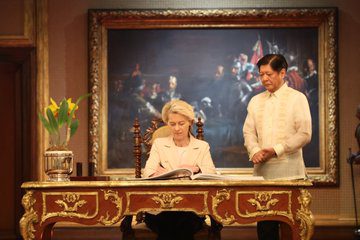
EU Commission President Ursula von der Leyen meets with Philippine President Ferdinand Romualdez Marcos Jr.
European Commission President Ursula von der Leyen moved to breathe new life into a prospective EU-Philippines free trade agreement this week, visiting Manilla to address rising Chinese influence in East Asia.
Plans for trade liberalisation between Europe and the Philippines were put on hold in 2016 after the election of firebrand populist President Rodrigo Duterte, who challenged the influence of Western NGOs in this country by launching an aggressive war on drugs.
Meeting Duterte’s more moderate successor, President Ferdinand Marcos Jr., von der Leyen outlined the EU’s objections to Chinese territorial claims in the South China Sea, announcing that Brussels would re-open negotiations with the Philippines over the stalled free trade agreement, which have been in the works since 2015.
Amid concerns about European overdependence on Chinese raw materials for its green transition, von der Leyen highlighted the fact that Manilla exports 90% of its nickel to China and suggested the Philippines focus instead on developing its processing capacity.
The sabre rattling by von der Leyen in Manilla is surprising after she articulated a moderate path of so-called de-risking towards Beijing in contrast to a more hawkish United States, which is fast disengaging from the Chinese economy.
While on the mend, EU-Philippine relations reached an almost comedic nadir during the tenure of President Duterte, who famously raised his middle finger to European leaders on live TV, in an expletive-laden speech, alleging that Western policies favoured drug dealers over the rule of law.
Von der Leyen also dangled the prospect of €466 million in green development aid as a sweetener, though some MEPs and NGOs still object to any deal with the Philippines due to alleged human rights abuses inflicted by its anti-drug policies.
Regarding the war between Russia and Ukraine, the Philippines has taken a largely pro-Ukranian position throughout the conflict, being seen as a strong American ally despite some anti-imperialist sentiment. Some experts have warned, however, that the youthful Asian country of 114 million could be hit by rising food and fertiliser prices triggered by the war.
The EU is the Philippines’ second most important export market after the United States with the country heavily reliant on European manufactured goods and chemicals. Brussels is scrambling to assert itself geopolitically amid rising global tensions, as it pursues similar free trade deals, such as the Mercosur agreement, with an increasingly autonomous South America to counter a rupture with Russia and China.
The Philippines is also of growing importance to European and American strategists due to its relative hostility to China in the South China Sea where the two countries are disputing sovereignty over several islands.
